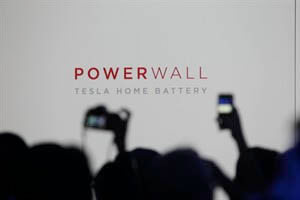Is the Tesla home battery pack worth the money?
They're useful but may not save you big bucks
Advertisement
They're useful but may not save you big bucks

CALGARY – When Tesla Motors announced its home-powering battery was going to be available in Canada next year, it did so with much hype, promising a convenient way of storing energy for overnight or backup use.
But beyond the fanfare, questions remain whether it is worthwhile for Canadians to purchase the sleekly packaged Powerwall batteries.
“In the short term, for the consumer walking into Home Depot tomorrow, it probably doesn’t have a lot of impact,” says Ian Rowlands, a renewable energy expert at the University of Waterloo.
That’s because in Ontario, where almost all solar power in Canada is produced, homeowners with solar panels can sell excess power back to the grid at a premium. That cuts out the incentive to spend money to store power.
The batteries could be useful in areas where electricity costs change at different times of the day, with consumers charging the battery at times of low cost and using the battery power at peak times. But the price differences aren’t big enough in Canada for that to make financial sense, says Rowlands.
The batteries, however, will give consumers control of their electricity supply, says Annette Verschuren, CEO of NRStor Inc. Her energy storage company plans to import the batteries to Canada along with Opus One Solutions Energy Corp., an electrical grid software firm.
Verschuren says the batteries will allow consumers to have a reliable backup power source or even go off-grid. The battery can power an average home for about half a day, according to Verschuren.
“That product will start to revolutionize and change the whole way we look at electricity,” says Verschuren.
Many, however, aren’t convinced the battery is revolutionary.
“There’s been a lot of hype surrounding it, but all it is is just a battery,” says David Kelly, CEO of Alberta-based solar energy firm SkyFire Energy.
“They’ve basically packaged up a bunch of lithium ion batteries with their battery management system and hung it on the wall.”
Kelly says the Tesla batteries, which sell south of the border for between US$3,000 and US$3,500, not including the price of an inverter, costs roughly double the price of a lead-acid battery system. Either system could effectively store solar power in a home, but Kelly says the Telsa battery would come in a smaller and lighter package and probably last longer.
The battery could be useful in places like California or Hawaii, says Kelly, where at peak sun more energy is produced than can be used. With a battery system, that excess power could be stored and then used during peak dinner hour when the sun is weaker.
Prices for the Powerwall batteries in Canada have not been set.
Share this article Share on Facebook Share on Twitter Share on Linkedin Share on Reddit Share on Email